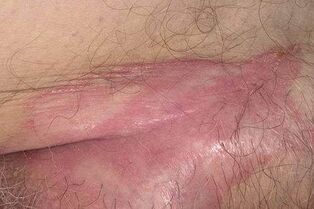Psoriasis is one of the most serious dermatological diseases. The pathology is autoimmune incurable in nature and occurs in patients of all ages. The characteristic of the disease is its wavy nature. Relapses are followed by periods of calm and vice versa. The duration of remission always depends on the type, form of the disease, as well as on the individual characteristics of the patient.

The main symptoms of psoriasis are unpleasant pink or red spots that appear on various parts of the human body. In medical practice, such rashes are usually called plaques or papules. In most cases, the plaques are covered with scales characteristic of pathology and rise above the surface of healthy skin by a few millimeters. Also, signs of psoriasis include signs such as severe itching in the area of the lesion and inflammation.
Psoriasis, the causes of which have not yet been clarified, is diagnosed in every tenth person who consults a doctor with skin problems. The pathology is predominantly among adults, but is often found in children. Residents of countries with cold and humid climates are at risk. The percentage of the disease in people in cold countries is higher than in people living in warm climates.
What is psoriasis: a theory of the origin of the disease
So far, it has not been possible to determine the exact causes of the disease, and it is also unclear how psoriasis begins. Even the joint efforts of world scientists do not allow the answer to the question why psoriasis occurs? According to Wikipedia, in modern medical practice there are several theories about the occurrence of this disease. However, none of them have an official backup. Theories for the development of psoriasis include the following:- Immune.
- Hereditary.
- Theory of hormonal disorder.
- Theory behind stress.
- Disorders of metabolic processes.
- Viral origin.
Based on clinical studies and laboratory data, scientists have been able to identify several points of view, suggesting possible causes of pathology development.
Theory of Immunity
Many scientists determine the causes of psoriasis in children and adults according to the characteristics of the immune system. This theory is by far the most widespread. From the point of view of its founders, the appearance of plaques on the body of different nature occurs as a result of the activity of immune cells that certain areas of the dermis perceive as aggressors. This results in severe inflammation and redness of the skin.

The causes of psoriasis on the body from the point of view of immune theory can be the following:
- rubbing skin with clothes and shoes;
- combustion; frostbite;
- microcracks;
- scratches.
According to the test results, it was possible to detect the presence of a large number of immune cells in the places where psoriatic spots appear. This is a partial confirmation of the immune theory.
Genetic theory
Its other name is inheritance theory. Many scientists believe that the disease is inherited. This is evidenced by numerous surveys whose results have shown that in the case of pathology in the mother, the risk of developing the disease in the child is 20-25%. If both parents suffer from psoriasis, the percentage increases to 75.
Genetic predisposition is considered one of the main factors in the development of the disease. By combining several provoking factors, the risk of pathology increases significantly.
Important! If a child’s parents are sick with psoriasis, it cannot give a one hundred percent guarantee that the child will certainly develop the same disease. Heredity only increases the risk of disease.
Endocrine Theory
The cause of psoriasis on the hands, back, head and other parts of the body has also been partially explained by endocrine theory. Here, scientists suggest that pathological changes in the dermis occur as a result of a hormonal imbalance in the body. Dysfunction of the normal functioning of the endocrine system provokes a decrease in the healthy vital activity of dermis cells.
Hormonal imbalances can occur for the following reasons:
- pregnancy period;
- menstruation;
- taking hormonal medications;
- puberty.
Important! According to the results of medical research, the violation of hormone levels in the patient's blood is not noticed in all cases. Given these facts, the endocrine system cannot be considered fundamental.
Neurogenic Theory
The occurrence of psoriasis is also supported by neurogenic theory. This view explains the onset of illness as a result of stress and strong emotional experiences. Representatives of this theory believe that the cause of psoriasis may be a malfunction of the central nervous system.

As a result of the experience, the patient has such a phenomenon as vascular wall neurosis. This causes narrowing of the musculature of the vessels and impaired blood flow. The result is the appearance of a rash on the body in the form of scaly plaques.
According to surveys in more than half of all patients with psoriasis, the onset of the disease was preceded by strong feelings and stress.
Exchange Theory
The reasons for the appearance of psoriasis in women and men can also be found in the violation of metabolic processes in the body. This is the opinion of the representatives of the theory of metabolic disorders.
Medical research has revealed a clear link between psoriasis and metabolic disorders in the body. Violation of lipids and other processes lead to changes in blood composition, weakened immunity and other negative consequences.
The following factors can cause metabolic disorders:
- presence of diabetes mellitus;
- kidney and liver diseases;
- unbalanced diet;
- sedentary lifestyle.
Virus Theory
Some scientists explain the causes of psoriasis by transmitting a viral infection or the presence of chronic inflammatory foci in the body. This theory is somewhat related to genetic. Representatives of this view believe that infection can become a stimulus for the development of pathology.
What factors can trigger psoriasis?
In addition to theories about the origin of the disease, there are several provocative factors. These include:
- Unhealthy diet, eating food allergens, insufficient amount of vitamins and minerals.
- Bad habits like alcohol and cigarettes, as well as taking drugs.
- Improper intake or untimely cancellation of medications.
- Various injuries of the dermis.
- Hormonal imbalance in the body.
Heredity and a combination of several provoking factors can lead to diseases such as psoriasis. It is very important to diagnose the pathology in a timely manner and start adequate treatment. This will help to avoid many negative consequences in the future.
Why psoriasis is dangerous
Initially, the disease may not cause much discomfort, but if left untreated, the disease will become severe with constant relapses. Therefore, it is important to start treatment on time and prevent the development of psoriasis. As a preventive measure, you can use traditional medicine and its means, but only with the consent of a doctor.
Now that you know what causes psoriasis, you need to start treating it. At the first symptoms, visit your doctor, self-medication can seriously damage your health.























